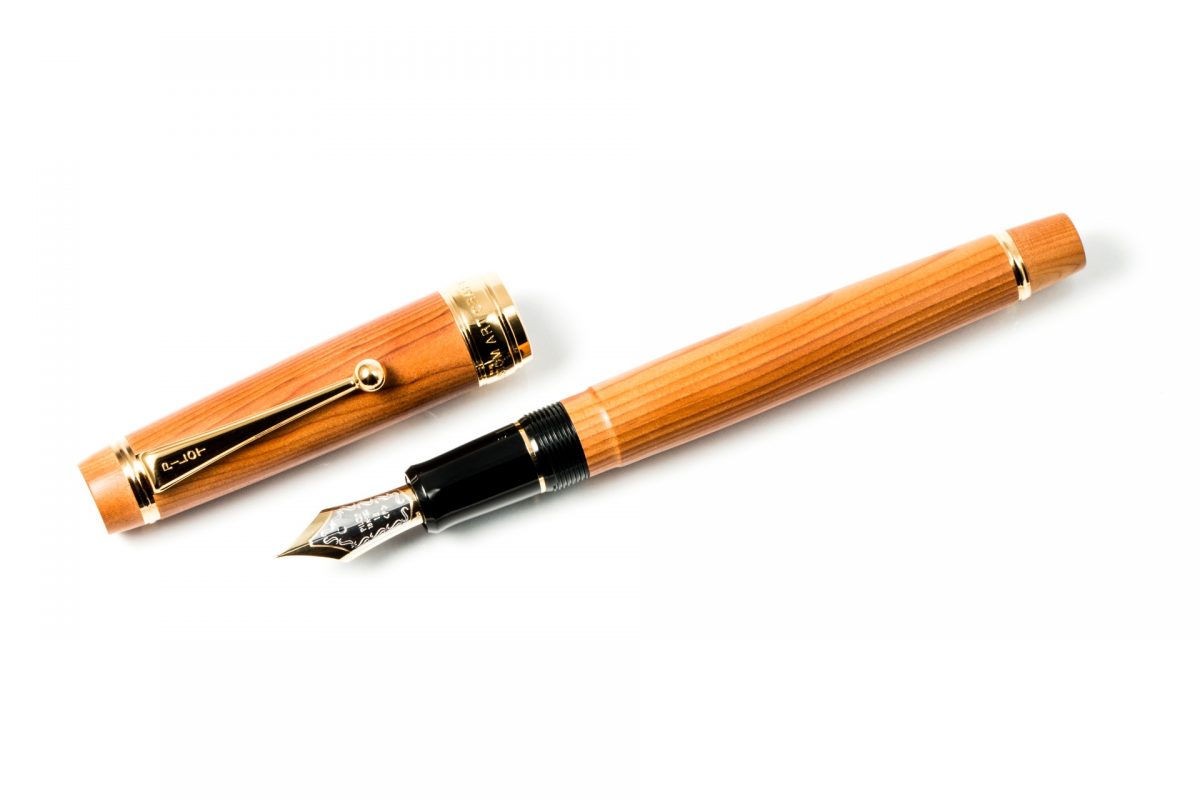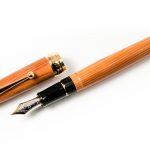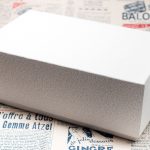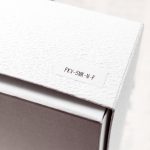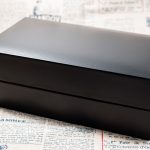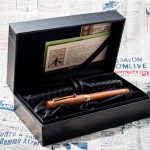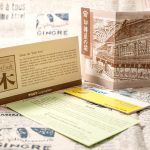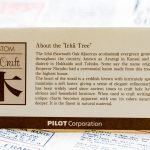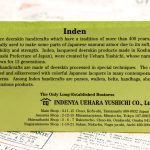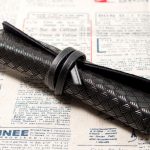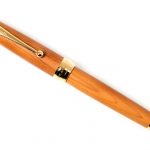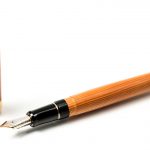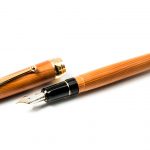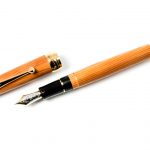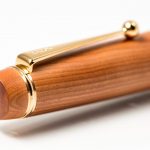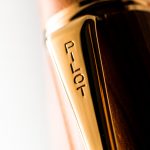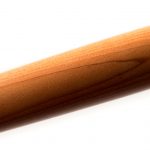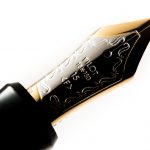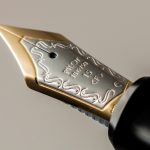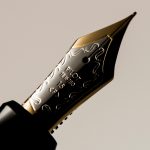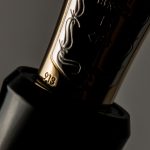INTRODUCTION: The Pilot Custom 845 was launched in 2002 and has since become the flagship fountain pen of the Japanese manufacturer. The number “84” refers to the 84th anniversary of the Pilot Corporation while “5” simply corresponds to a ¥50,000 price tag.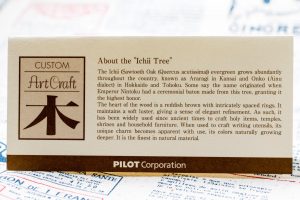
After I purchased the pen, I realised that a card from the Pilot Pen Corporation describes it as having originated from “Sawtooth Oak” or “Quercus Acutissima”. Sawtooth Oak from the species Quercus Acutissima belongs to a family called “Fagaceae”, or “Beech wood”.
Having done research on the term “Ichii” online, I found that the word almost certainly refers to “Japanese Yew” or “Taxus Cuspidata”. I would like to highlight that Sawtooth Oak and Japanese Yew are totally different materials. The story goes that the Emperor Nitoku declared the wood to be of the highest rank and had a scepter made from it. The well known Ichii-itto-bori woodcraft technique is also understood to employ Japanese Yew wood or “Taxus Cuspidata”.
Therefore, the exact species of wood used to manufacture the Custom 845 Ichii is still in question, though it is most probably Taxus Cuspidata as that is what it is overwhelmingly identified as online.
The 845 comes in different finishes like Black and Vermilion Urushi. Two other variants of the 845 are available as well – the Ichii (Taxus Cuspidata) and recently released Enju (Sophora Japonica). Ichii means Japanese Yew and Enju is a word for the Pagoda Tree.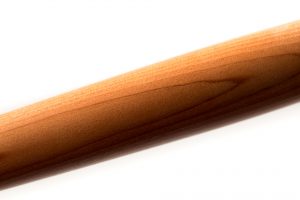
“Ichii” is a Japanese word which refers to the Japanese Yew tree, also known as Spreading Yew or by its scientific name “Taxus Cuspidata”. Taxus Cuspidata is a member of the genus “Taxus” and is native to Japan, Korea, Northeastern China as well as Southwestern Russia.
Yews are coniferous trees or shrubs in the family Taxaceae. The trees are slow-growing and long-lived, reaching heights of 1 – 40 metres with trunk diameters of up to 5 metres. The yew bush is extremely poisonous to small animals and is toxic enough to kill a horse.
Yew wood is reddish brown and really springy, therefore the wood was used primarily to make longbows. It has intricately spaced rings and maintains a soft luster. In Japan, the wood has been widely used since ancient times to craft holy items, temples, shrines and household furniture. The story goes that Nintoku, the 16th Emperor of Japan, had a ceremonial baton made from the tree – granting it the highest honour.
The Pilot Custom 845 Ichii fountain pen comes with an outer box and inner box. Opening the textured white box, a black faux leather box is revealed. It contains the pen, which lies on a black satin platform. Behind the pen is a gorgeous pouch made of lacquered deerskin from Inden-ya, as well as the instruction manual and papers which describe the origin of the wood and deerskin pouch.
Appearance & Design (8/10) –The Pilot Custom 845 is a rather traditional fountain pen with a timeless appearance. I would say it looks conservative, but for good reason – the 845 is knocking on the door of Namiki. It is worthy to note that Namiki does not manufacture wood pens, so the Pilot Custom 845 Ichii and Enju are currently the most high end wood pens made by the Pilot Corporation.
The Pilot Custom 845 Ichii, like all high-end Pilot pens, has a traditional Namiki-style clip which tapers toward a round ball. I prefer a sword shaped clip like the ones found on the Custom Heritage series pens. Apart from that, I do enjoy the incredible beauty of the wood grain and like how the pen is made from a single piece of wood where the grain links up perfectly.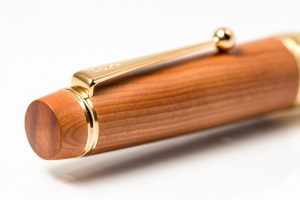
I will always pick a wood pen over the plain black or red urushi finish, as it is a more interesting material. The fact that each pen is made of a different piece of wood means that every piece is unique.
I picked this particular piece because the grain was well defined and the colour of the wood was really vibrant. I would advise the uninitiated that when buying a wood pen, it is important to first examine the grain and make sure that you like the one you are buying, as no two pieces are alike.
Construction & Quality (10/10) – The Custom 845 Ichii is flawlessly executed in its construction and I have no doubt that it is manufactured to the highest of standards. Examining the pen under a loupe, I could see no rough edges and a slight lustre.
I have long been an admirer of wood pens – from the extravagantly priced Graf von Faber Castell Intuition Pernambuco, to the exotic Platinum #3776 Yakusugi and Pilot Custom Kaede. The Pernambuco and Yakusugi are simply too expensive while the Kaede had the right size but didn’t have flat ends.
Quality wise, wood is a useful material because it offers better grip. Unlike lacquer, it does not get oily easily. It is also warm to the touch, compared to pens made entirely of metal. Some people may prefer wood pens because wood feels like a more natural material and is an organic.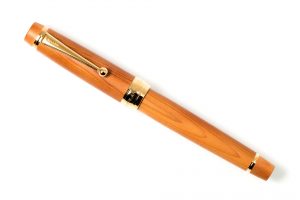
Wood is a robust material – treated correctly, it can last a lifetime. Trees have been known to live for thousands of years, and the species of wood used to make the Custom 845 Ichii is also known to be long-lived. This is why I have confidence in the construction of the Custom 845.
Weight & Dimensions (10/10) – The Custom 845 Ichii is heavier and larger than many other wood pens that I have encountered – a nice step up from Pilot’s own Custom Kaede Maple pen which comes in at a lower price point. It is also slightly heavier than the original Custom 845 coated with urushi lacquer.
I have owned pens from the Sailor Precious Wood of the World Sapporo series. However, I decided to let them go mainly because of their size. The Sapporo sized wood pens are simply too small. I still hold on to the Sailor 1911 Profit Hakone Yosegi Zaiku mainly because of its most singular mosaic wood finish.
The Custom 845 Ichii is not very heavy and can be said to be of a comfortable weight. Posting the cap is possible, but may cause the pen to be top heavy because the pen is pretty long and the center of gravity would be higher. I would not recommend posting the cap though, because repeatedly doing so may affect the wood quality.
Here are the weight and dimensions of the Custom 845 Ichii:
Weight: 32 grams
Length with cap closed: 14.8 cm
Diameter: 1.4 cm
Nib & Performance (7/10) – The Pilot Custom 845 Ichii comes with a two-tone, #15 sized 18K gold nib and I selected the Fine over Medium and Broad. The nib has the numbers “913” engraved on the bottom of nib, this is probably a reference to the date of manufacture – September 2013. Compared to the lower range Pilot Custom 823, the 845 is clearly more exclusive and the purity of the gold used to manufacture the nib is a testament to this fact. The nib is available in Fine, Medium and Broad just like the 14K gold versions.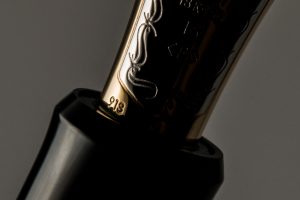
Out of the box, I could tell that the nib on the Custom 845 Ichii was well aligned and that it was manufactured well – polished to a beautiful shine and without any micro scratches. The nib was also plated properly, and the two-tone treatment was applied flawlessly. On some pens, the silver parts and gold parts do not match up properly with the engravings but this was not the case on the Ichii.
People have asked me countless times what I thought about nibs from different brands – I can say that nibs today are rather unpredictable when it comes to manufacturing quality and performance. They are hand made after all, so I guess there are variations. The nib on my Custom 845 Ichii lays down a thin line and is pretty smooth and wet, so I have no complaints!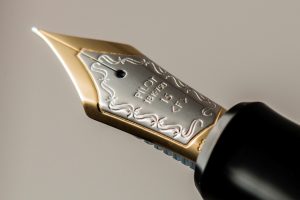
The only issue I can find with Pilot’s 845 series is that despite its status as a brand flagship, there is only a selection of three different nibs. I would expect the brand to showcase their specialty nibs on these pens and give users more choices, especially at this price range. The Pilot FA nib is definitely more interesting, and the Soft Fine nib would make a great option for comfortable writing. I would also seriously consider a SU stub nib – these are only available on the Custom Heritage 912, Custom 742 and 743 series pens.
Pilot nibs are never bad, but they do have slight feedback to them which would pose a problem on low quality paper. I would hesitate to describe the nib on the Pilot Custom 845 Ichii as scratchy, because that is not the case. The nib has some spring to it, which is unsurprising given its size. However, it is not made for flex or softness, so I would not recommend applying any pressure to it.
Filling System & Maintenance (8/10) – The Custom 845 Ichii is a cartridge-converter filled pen that is compatible with the entire range of Pilot converters from the CON20 to the CON50 and CON70. The pen comes with a silver coloured CON70, which is the highest in capacity of the lot. The CON70 is the same converter used in most of the Namiki range maki-e pens.
The push-button CON70 isn’t my favourite converter – I cannot stand the fact that even when emptying it out, some ink remains stuck in its innards. I also do not like the fact that the converter cannot be easily taken apart. The CON20 is simply less problematic despite its low capacity. In addition, it is a pretty pricey part should you need to get it replaced.
For most people, the CON70 is almost perfect and would serve them well because of the convenience of its push-button mechanism. Its large ink capacity would suit long writing sessions and deliver a reliable, uninterrupted supply of ink to the nib and feed.
Cost & Value (9/10) – Pilot’s Custom 845 Ichii is a pen worthy of its price. It does not come cheap, but I would highly recommend the pen because it comes in a great package. Unlike some of the other exotic wood offerings, the Ichii has a comfortable weight and size. The Inden deerskin pouch is also a very thoughtful addition, though it can only fit one pen.
The Pilot Custom Art Craft 845 Ichii retails at S$749 including tax here in Singapore. That is approximately US$600, €460, or £368. It can also be obtained on eBay.
Conclusion (Final score, 8.66666667/10) – The moment I learnt that Pilot had released a wood variant of the 845, I knew I had to get my hands on one. Unfortunately, the Ichii was simply too expensive. So I waited a long time and today I finally own one. I picked the Ichii over the Enju because I liked its clean appearance and well defined wood grain.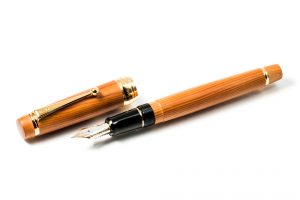
The pen isn’t perfect – I wish it had a sword shaped clip like the Enju version. I also wish there were more nib options available. That being said, for what it is worth the Pilot Custom 845 is a very strong performer and comes in a very nice package. The timeless appeal of wood as a natural organic material as well as its many useful qualities makes the Custom 845 Ichii a great investment.
The Custom 845 Ichii is a fitting flagship at the top of the Pilot range of pens. It puts together the best of materials and demonstrates impeccable workmanship with great attention to detail. The Custom 845 isn’t lavish, but it is definitely classy and understated in its elegance. These are all qualities that we have come to associate with the Japanese brand.

